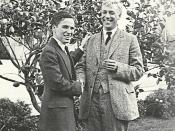The 1920s and 1930s were known to be the period when Canada lost his identity
to Americanization by politically, economically and socially. Politically, Canada copied
U.S. policies during depression and economically Canada was dependent on U.S. and
culturally Canada was influenced by America's entertainment and lifestyle.
Canada's Prime Minister R.B Bennett copied the FDR's deal during depression,
which was made by U.S. Franklin Roosevelt promised 'a new deal for the American
people' and Bennett's promises were dependent on the new economic program of U.S.
On January 3, 1935, Bennett introduced FDR policy to all Canadians who were surprised
from this policy. Therefore, Bennett's new policy didn't work. He made this deal so the
government would change, so he could win the elections. Bennett's new deal only helped
few Canadians who were unemployed. Other people thought that it was just an effort to
win the election. Bennett lost the election and Mackenzie King became Prime Minister.
So, Canada lost its identity by following the policy that was made by the U.S.
Secondly, Canada was totally dependent on U.S, means that U.S. helped
rebuilding the Canada's economy and Canada started buying cars for U.S. Pulp and
paper industries were developed in U.S. and exported to Canada as demand for there
products grew. Canadian automobile manufactures could not compete and by the
end of the decade they were forced to make and sell American models. U.S. helped
Canada to rebuild their economy by exporting industries, which recovered Canada
much better after WWI. Also, Canada manufactured American cars because of the
difference in prices. These things were linked to Americanization and proofed that
Canada was highly dependent on America.
Lastly, The Canadians were mostly influenced by the American culture
mainly in entertainment and lifestyle. Canadians loved Hollywood movies and really like
American film stars e.g. Charlie Chaplin. As well as, Canada started the 'chain' of
movies that had been overtaken by the American distribution network. In addition, the
first Canadian jazz recording was made in Toronto from the influence of American
artists. Canadians were very effected from the Hollywood movies and Jazz music and
adopted them really fast. If Canadians wanted to become actors, they had to go America
to be recognized. Canada lost its identity when American producers distributed the chain
of movies in Canada. Jazz music also impressed Canadians, which made them to affirm
and record the music in Canada.
In conclusion, Canada copied the U.S. policies in 1930s as a politically
perspective. Economically, Canada was dependant on U.S. and culturally Canada was
very influenced from entertainment and lifestyle of U.S. So, the 1920s and 1930s was a
period during which Canada was beginning to lose its unique identity to Americanization.

